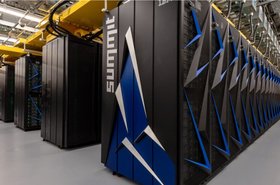The Texas Advanced Computing Center plans to expand its Frontera supercomputer for urgent computing workloads.
11 racks will be added due to an award from National Science Foundation and a contribution from Dell Giving.
Helping fight Covid-19
The expansion adds 396 Dell R640 server nodes, along with the Nvidia/Mellanox InfiniBand HDR cards and switches to connect into Frontera's high speed fabric. Each node has two Intel Xeon Platinum 8280 processors and 192GB of DDR-4 memory, the same as Frontera's existing 8,008 compute nodes.
"This supplemental award from NSF and generous gift from Dell allows us to continue to support researchers responding to national and global emergencies, without sacrificing the fundamental science that the Frontera system was built for," said Dan Stanzione, TACC executive director.
The expansion will add nearly 3.5 million node hours of compute time annually to the 70 million currently available on Frontera. The new racks are expected to be available to researchers from January 2021.
The new computing resource will be focused on urgent computing capabilities, starting with the Covid-19 crisis and workloads related to hurricanes.
In the early days of the pandemic, TACC devoted more than 30 percent of its computing resources to Covid-19 helping more than 50 teams to explore the virus. During the hurricane season, TACC interrupted its standard tasks 10 times to produce emergency storm surge simulations for hurricanes making landfall in the Gulf of Mexico.
This month, Frontera came ninth on the Top500's list of world's fastest supercomputers, with a peak performance of 23.5 petaflops.
"NSF is pleased that the foundation's cyberinfrastructure investments, including those at TACC, have been quickly and successfully mobilized to address urgent national needs without sacrificing our commitment to supporting long-term basic research on behalf of the Nation's future," said the Director of the NSF Office for Advanced Cyberinfrastructure Manish Parashar.



